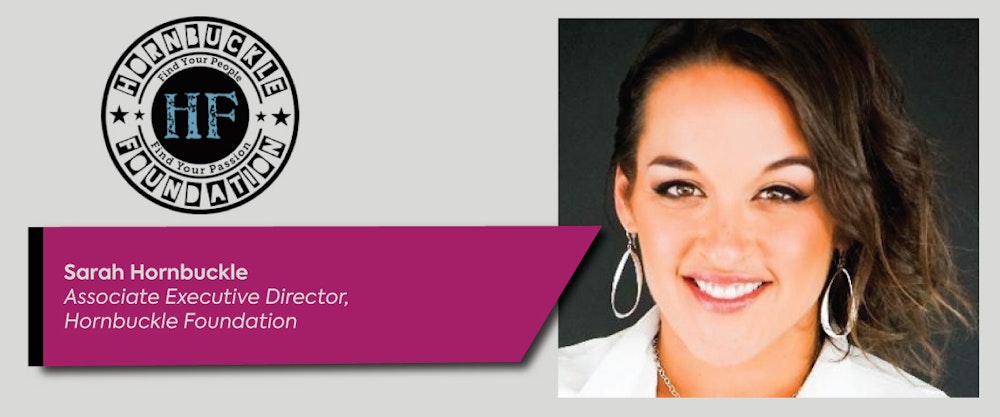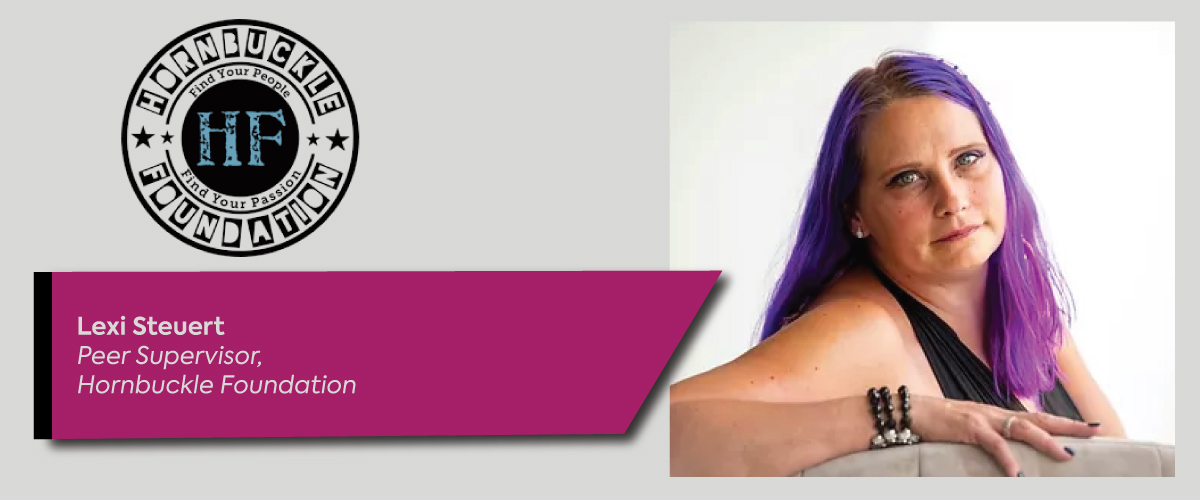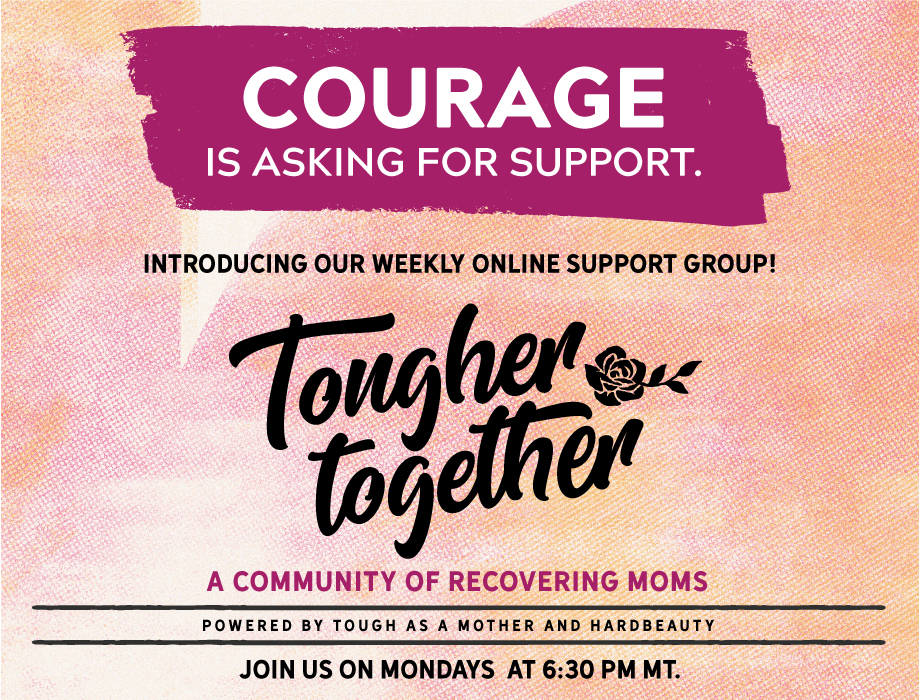
FOR THESE INCREDIBLE MOMS, RECOVERING OUT LOUD GOES BEYOND STORYTELLING. THEY’RE USING THEIR LIFE JOURNEYS TO COACH THEIR PEERS THROUGH RECOVERY.
HORNBUCKLE FOUNDATION
Sarah Hornbuckle
Associate Executive Director
The Hornbuckle Foundation was founded in 2015 to provide more sober living options in the Denver Metro Area and to help people with substance use disorder find tools and resources to transition into productive and healthy members of society. Today, Sarah Hornbuckle, Associate Executive Director of the Foundation, has helped grow it into a powerhouse of recovery support and a leader in training peer coaches.
Sarah started the Foundation with her husband, Michael. After two decades of addiction himself, Michael knew that recovery requires more than just providing treatment. He and Sarah started the Hornbuckle Foundation out of a shared passion to serve the community by focusing on bridging the gap in the continuum of care for individuals transitioning from inpatient treatment to seeking affordable, safe and sober housing. In 2019, the mission of the Foundation was simplified to focus on providing assistance where support was limited, including raising funds for individuals to recover in safe and structured environments, drastically improving an individual's chances of obtaining sustainable recovery.
Sarah is a Nationally Certified Peer Support Specialist who has helped hundreds of women and their families through the recovery journey. Her own life journey makes her especially empathetic when working with moms. In her 20’s, Sarah put herself in relationships full of alcoholism, domestic violence, drug abuse, and mental health issues, all while trying to raise three kids alone. At the age of 27, the trauma had built up and she turned to substance abuse to cope. After three years, she says she had to “choose between throwing my life away and sobriety. I chose sobriety.” That’s when Sarah met Michael and their dream for the Hornbuckle Foundation began.
“When we decided to start this, we knew we wanted to provide sober living scholarships for people that are coming out of residential treatment,” Sarah explained. “If they can't pay their rent, we help pay it for them. We pay weekly so that they have an incentive to meet with their peer coach. It's a give and take culture and we promise to help them with all the dimensions of wellness.”
Today, Hornbuckle Foundation has 18 peer coaches, about 150 clients and they work with over 200 sober living homes. Sarah explained that they offer case management, therapy, and peer coaches. “We start with asking the moms who come to us what they need. It might be eyeglasses or it might be food and clothes or a safe place to live. Whatever they need to help in their transition to recover, we have the resources,” she said.
They also provide another unique support. “When people are going through treatment and recovery, it takes about a year for their brains to rewire, especially if they’ve been in and out of jail or on the street,” Sarah said. “Their brains are all about fight or flight. So, we also help them get microcurrent neurofeedback therapy to help reroute their pathways.”
The Power, and Inspiration of Peer Coaches
Peer Coaches – people who have lived through the same things as the people they are coaching – are an invaluable part of recovery for moms. And, the opportunity to learn to be a peer coach is an incredible opportunity for moms who have been through recovery and want to give back. It can also become an entry to a new career. “People who are coming out of jail can’t just go apply for, and get, a job,” Sarah said. “So, we help them see that they can use their talents to be a Peer Coach, and also become a small business owner. We teach them how to set up an LLC, pay taxes, and we provide billing and supervision for them. We help take away the financial stress by getting grant funding to help them pay for things like liability insurance, NADAC memberships, and some stipends, and try to alleviate as many costs as possible. I love saying to them, ‘Yes, you're a business owner’, now let’s start there.“
“My motto is that we take former dope dealers, and turn them into hope dealers,” Sarah says. ”I think addicts and alcoholics have tenacity, but also we grieve with each other. We weep with those who weep, and we rejoice with those who rejoice. Our coaches were there and made it out. And instead of feeling like they made it out and somebody else didn’t, they’re going back and grabbing somebody else to come out. I think what recovery looks like is selflessness. It's being of service, and being willing to say yes when somebody reaches out to you for help. That's what recovery looks like.”

From Mom in Recovery to Peer Coach
Lexi Steuert
Peer Superviser
When Sarah first went to AA meetings herself, a woman named Lexi helped her get sober, and stay sober, just by being at the meetings and sharing her experiences about being a mom. “She had such an impact on me,” Sarah said. “So, when our Foundation was looking for coaches, I asked Lexi if she would consider peer coaching. She already had the credentials and degrees to be a therapist, but wasn’t using them. Because of her lived experiences and her education, Lexi can be both a peer and a clinical therapist, and can help both groups understand each other and work together.”
Lexi says that as a coach, what she does for moms is try to share her experience, strength, hope, and understanding. “I want them to know that they can walk through the path that I walked through,” Lexi said. “My personal journey began when I was a year sober but then got in a car accident and became dependent on pain medication. In trying to get off the pain meds, I relapsed on meth and alcohol and ended up losing my kids.” At that point, the judge had told me that I was unsafe and that I would never see my kids unsupervised again. Despite that hope being taken away from me, I learned how to navigate through that court system and do the right things and I got my kids back.”
During that time, staying sober wasn’t the only thing Lexi was battling. “At about nine months sober I was suicidal. I just could not handle my emotions. I put myself back into treatment, and that was at the point where I was diagnosed with some mental health stuff,” Lexi explained. “That time, providers actually spent the time with me to teach me about my mental health, and about my addiction, and how to partner those together, and treat those both as a priority. Because any time in my life, when one had become the priority, the other would fall. And it was when I started to understand both of those things together, and how to care for those things together that I actually got well, and on solid ground.”
Sarah says that one of the things she most loves about Lexi being a Peer Coach, is that she still has kid issues, relationship stuff, health issues, and life struggles. And so, when she coaches people, she can tell them that she is going through all of this right now, too. Sarah tells other moms, “There are no excuses for women to not show up. If Lexi can show up, anybody can show up.”

TO PROVIDERS FROM SARAH
“If you’re a treatment center who would like to know more about our sober living work, please check our website. We have an application for people to apply from treatment to be able to move into sober living and it’s a really easy pathway for us to be able to help them pay as well as creating an aftercare plan for providers. And, if you have a patient you’ve helped but now their insurance is up, we can also help find resources to get people into detox quickly. If we don’t have the answer you need, we'll find one.”
FROM SARAH, TO OTHER ORGANIZATIONS HELPING MOMS IN RECOVERY
“We are lucky to work with a lot of amazing partners and we don’t see others in this same field as competition. The need is abundant and there’s enough to go around. Let’s work together and be willing to collaborate to give people the absolute best outside support system.”
HOPE FUND
Hope Fund sponsors have been established in honor of a loved one or by organizations. Monies raised help individuals who want to get into a recovery program but currently do not have the financial means to do so. Learn more here.
Share this article:







